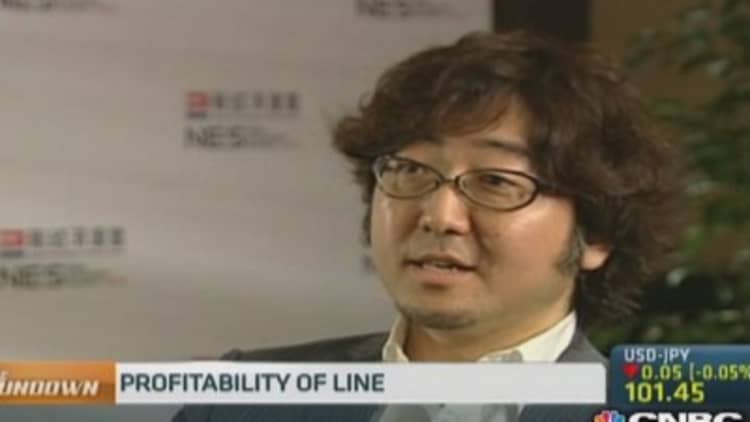
The fastest growing messaging application in the world told CNBC they are struggling to break into the world's second largest economy.
Online messaging application LINE has enjoyed exponential growth since it was first launched in Japan in 2011. It now has over 400 million registered users and clocked up revenue of almost $340 million in 2013.
Although the largest share of its users are Japan-based at 50 million, LINE recently announced that since the start of the year, the number of countries with over 10 million registered users rose to 10, including America, Korea, Malaysia, and Mexico.
It has 24 million users in Thailand, 20 million in Indonesia and 18 million in India.
Read MoreWhy chat apps are the next 'breed' of social networks
However, China has proven a tricky market for LINE thus far following an unsuccessful attempt by parent company Naver Corporation - originally known as NHN Japan - to crack the market. It faces stiff competition from China's largest messaging app WeChat which has 300 million users.
"The competition is very tough," said Akira Morikawa, LINE's CEO.
"When you do something new, you will almost instantly be surrounded by copycats. There are a number of regulations that make a direct entry very, very difficult too. It's a hard market," he added.
Despite the obstacles Morikawa said the firm is making progress in the region.
"LINE is starting to gain traction in China, although we are very, very small compared to WeChat. But it's possible," he added.
Read MoreCandy Crush? WhatsApp? Sure looks like a bubble
The U.S. is another key market for LINE, where it faces strong competition from WhatsApp. The firm says it has 10 million users there, and according to recent media reports, has looked into hiring advertising agencies to help translate its Asian style of communication into the U.S.
"Our service is a little different from what's available in the U.S. You can use stickers to communicate," said Morikawa.
"On the one hand, I'm hopeful that our uniqueness will translate well in the U.S. but we need to work harder to see if we can provide value," he added.
LINE began as an instant messaging and internet phone service but expanded into a social content platform. It makes its money by selling users oversized emoticons, stickers and games.
The firm is not profitable yet but Morikawa told CNBC that this was not a concern at the moment.
"It's not very meaningful for us right now to think about profitability. Look back at Twitter. They IPOed while they were still in the red," he said.
Read MoreChina consumer prices up 2.4% in March
"What's most important now is increasing value for our users. So our objective right now is not to grow profits but to expand our user base as much as possible," he added.
The firm is targeting 500 million users by the end of 2014, and according to recent media reports is aiming for a billion by the end of 2015.
Rumors have circulated recently that Line may be considering an initial public offering for close to $15 billion.
Read More Blackstone on WhatsApp deal: 'Beauty in eye of beholder'
Morikawa told CNBC it was a possibility but he had not made a decision yet.
In February, Facebook agreed to buy WhatsApp for $19 billion, while Japanese online retailer Rakuten announced a $900 million acquisition for another messaging app Viber.
LINE does not disclose its monthly active user numbers, only registered user numbers, making it difficult to compare its popularity to apps like WhatsApp, which has 465 million active users.




